 Technology peripherals
Technology peripherals
 AI
AI
 Tsinghua University and other open source 'tool learning benchmark' ToolBench, fine-tuning model ToolLLaMA performance surpasses ChatGPT
Tsinghua University and other open source 'tool learning benchmark' ToolBench, fine-tuning model ToolLLaMA performance surpasses ChatGPT
Tsinghua University and other open source 'tool learning benchmark' ToolBench, fine-tuning model ToolLLaMA performance surpasses ChatGPT
Human beings have the ability to create and utilize tools, allowing us to break through the limitations of the body and explore a wider world.
The basic model of artificial intelligence is similar. If you only rely on the weights obtained in the training stage, the usage scenarios will be very limited. However, the recently proposed tool learning combines specialized tools in specific fields with large-scale The combination of basic models can achieve higher efficiency and performance.
However, the current research on tool learning is not in-depth enough, and there is a lack of relevant open source data and code.
Recently, OpenBMB (Open Lab for Big Model Base), an open source community supported by Tsinghua University Natural Language Processing Laboratory and others, released the ToolBench project, which can help developers build open source, large-scale, High-quality instruction tuning data that facilitates the construction of large language models with the ability to use common tools.

The ToolBench warehouse provides relevant data sets, training and evaluation scripts, and the functional model ToolLLaMA fine-tuned on ToolBench. The specific features are: 1. Supports single tool and multiple tools Tool solution The single tool setting follows the LangChain prompt style, and the multi-tool setting follows the AutoGPT prompt style. 2. The model reply not only includes the final answer, but also includes the model’s thinking chain process, tool execution and tool execution results 3. Support Real-world level complexity, supporting multi-step tool calls 4. Rich API that can be used for real-world scenarios such as weather information, search, stock updates, and PowerPoint automation 5. All data is automatically generated by the OpenAI API and filtered by the development team. The data creation process is easily scalable However It should be noted that the data released so far is not final, and researchers are still post-processing the data to improve data quality and increase the coverage of real-world tools. ToolBench The general idea of ToolBench is to train large language models in supervised data based on BMTools.
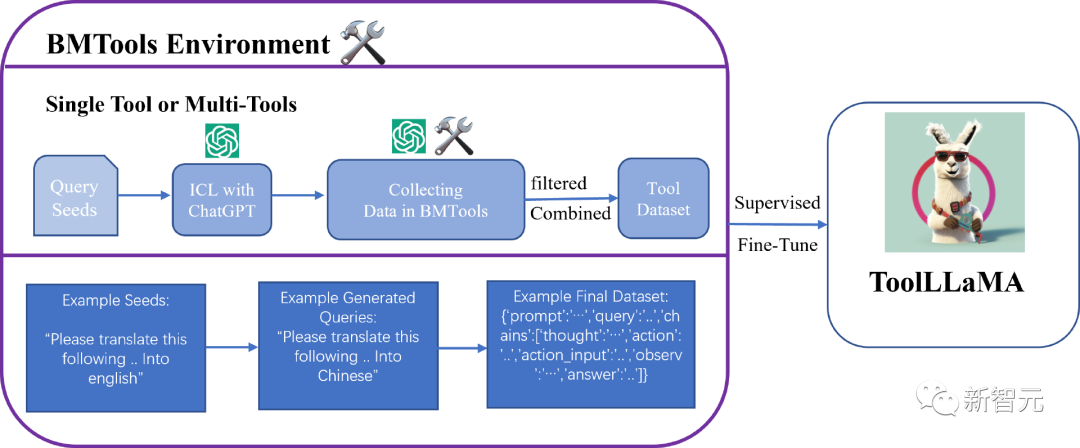
##The warehouse contains 9,800 pieces of data obtained from 312,000 real API calls, covering single Tool scenario and multi-tool scenario, the following is the statistical information of single tool.
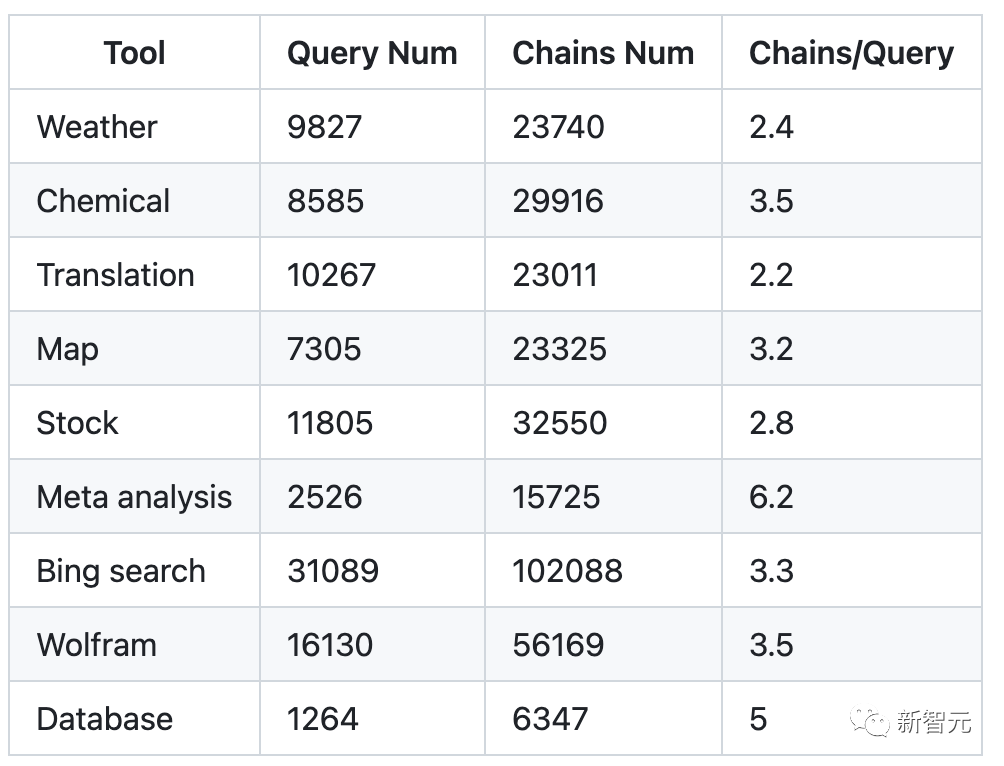
Each row of data is a json dict, including the prompt template for data creation, Human instructions (queries) for tool usage, intermediate thought/tool execution loops, and final answers.
Tool Descrition:BMTools Tool_name: translationTool action: get_translationaction_input: {"text": target texts, "tgt_lang": target language}Generated Data:{"prompt": "Answer the following questions as best you can. Specifically, you have access to the following APIs:\n\nget_translation: . Your input should be a json (args json schema): {{\"text\" : string, \"tgt_lang\" : string, }} The Action to trigger this API should be get_translation and the input parameters should be a json dict string. Pay attention to the type of parameters.\n\nUse the following format:\n\nQuestion: the input question you must answer\nThought: you should always think about what to do\nAction: the action to take, should be one of [get_translation]\nAction Input: the input to the action\nObservation: the result of the action\n... (this Thought/Action/Action Input/Observation can repeat N times, max 7 times)\nThought: I now know the final answer\nFinal Answer: the final answer to the original input question\n\nBegin! Remember: (1) Follow the format, i.e,\nThought:\nAction:\nAction Input:\nObservation:\nFinal Answer:\n (2) Provide as much as useful information in your Final Answer. (3) Do not make up anything, and if your Observation has no link, DO NOT hallucihate one. (4) If you have enough information and want to stop the process, please use \nThought: I have got enough information\nFinal Answer: **your response. \n The Action: MUST be one of the following:get_translation\nQuestion: {input}\n Agent scratchpad (history actions):\n {agent_scratchpad}","query": "My intention is to convert the data provided in ما هي الأقسام الثلاثة للقوات المسلحة؟ into Arabic(ara).\n","chains": [{"thought": "I need to use the get_translation API to convert the text into Arabic.","action": "get_translation","action_input": "{\"text\": \"What are the three branches of the military?\", \"tgt_lang\": \"ara\"}","observation": "\"ما هي الفروع الثلاثة للجيش ؟\""}],"answer": "The translation of \"What are the three branches of the military?\" into Arabic is \"ما هي الفروع الثلاثة للجيش ؟\"."}Model experiment
Machine evaluation: The researchers randomly selected 100 chain steps for each tool steps) to build a machine evaluation test platform, with an average of 27 final steps and 73 intermediate tool call steps, where the final step is evaluated using the Rouge-L metric, and the intermediate step is evaluated using the ExactMatch metric.
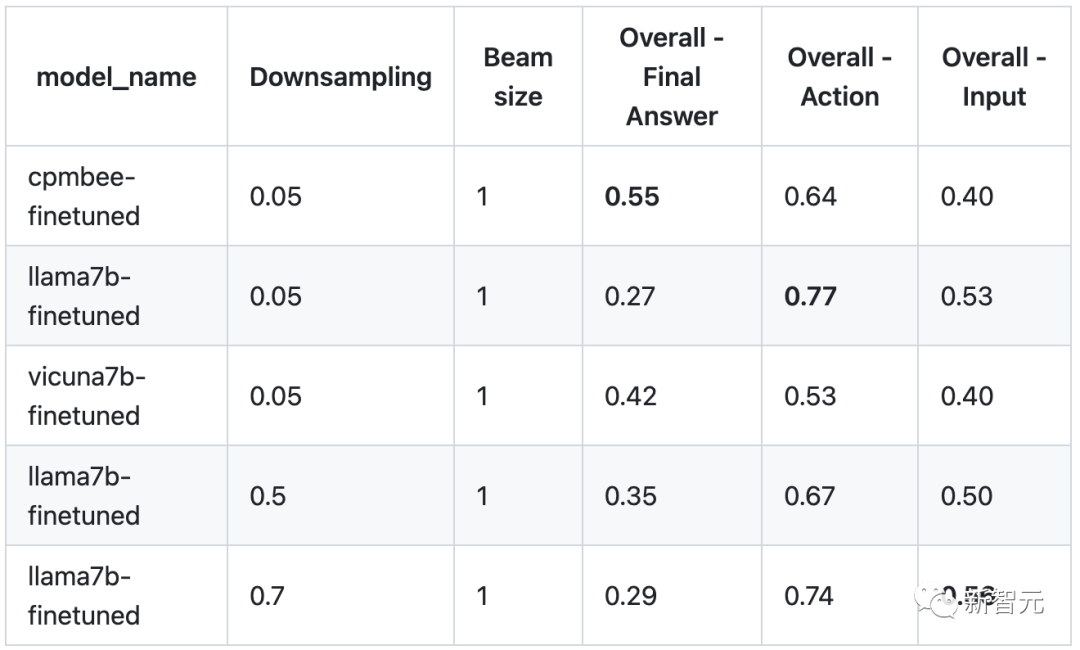
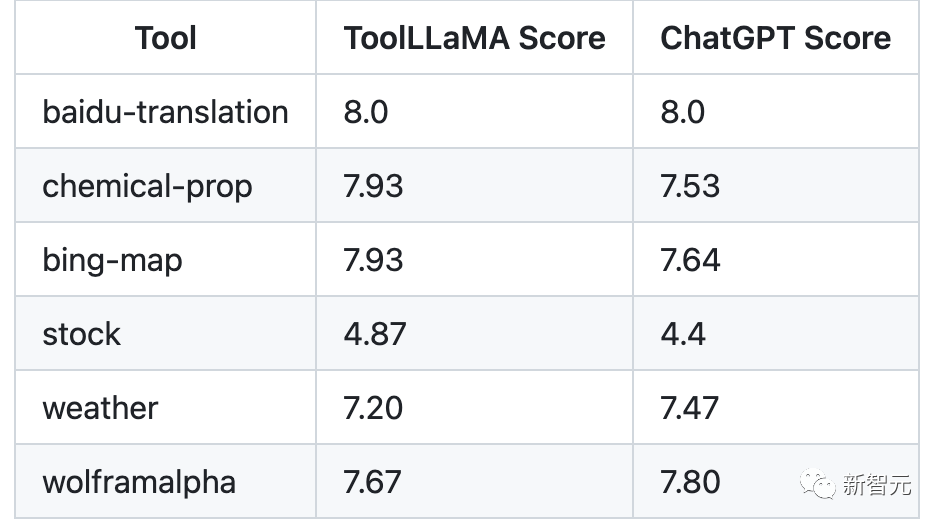
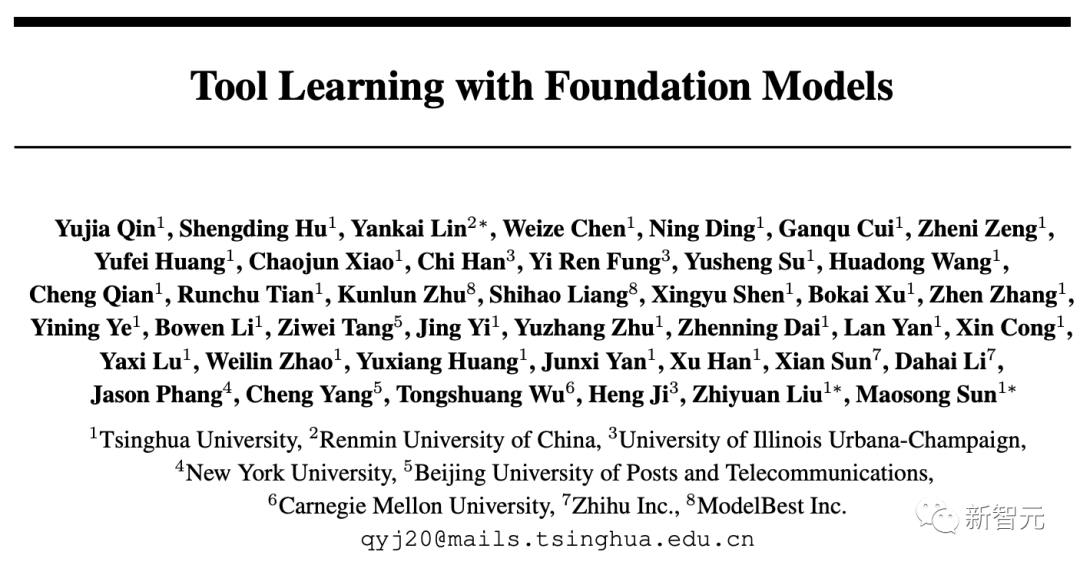 Paper link: https://arxiv.org/pdf/2304.08354.pdf
Paper link: https://arxiv.org/pdf/2304.08354.pdf
The article also reviews existing tool learning research, including tool-enhanced and tool-oriented learning, and formulates a general tool learning framework: starting from understanding user instructions, the model should learn to decompose a complex task into Several subtasks, dynamically adapt the plan through reasoning, and conquer each subtask efficiently by choosing the right tool.
The article also discusses how to train models to improve tool usage and promote the popularization of tool learning.
Considering the lack of systematic tool learning evaluation in previous work, the researchers conducted experiments with 17 representative tools and demonstrated the performance of the current base model in skillfully utilizing the tools. potential.
The paper ends by discussing several open issues in tool learning that require further research, such as ensuring safe and trustworthy tool use, implementing tool creation with basic models, and solving personalization difficult problem.
Reference materials:
https://github.com/OpenBMB/ToolBench
The above is the detailed content of Tsinghua University and other open source 'tool learning benchmark' ToolBench, fine-tuning model ToolLLaMA performance surpasses ChatGPT. For more information, please follow other related articles on the PHP Chinese website!

Hot AI Tools

Undresser.AI Undress
AI-powered app for creating realistic nude photos

AI Clothes Remover
Online AI tool for removing clothes from photos.

Undress AI Tool
Undress images for free

Clothoff.io
AI clothes remover

AI Hentai Generator
Generate AI Hentai for free.

Hot Article

Hot Tools

Notepad++7.3.1
Easy-to-use and free code editor

SublimeText3 Chinese version
Chinese version, very easy to use

Zend Studio 13.0.1
Powerful PHP integrated development environment

Dreamweaver CS6
Visual web development tools

SublimeText3 Mac version
God-level code editing software (SublimeText3)

Hot Topics
 1386
1386
 52
52
 Bytedance Cutting launches SVIP super membership: 499 yuan for continuous annual subscription, providing a variety of AI functions
Jun 28, 2024 am 03:51 AM
Bytedance Cutting launches SVIP super membership: 499 yuan for continuous annual subscription, providing a variety of AI functions
Jun 28, 2024 am 03:51 AM
This site reported on June 27 that Jianying is a video editing software developed by FaceMeng Technology, a subsidiary of ByteDance. It relies on the Douyin platform and basically produces short video content for users of the platform. It is compatible with iOS, Android, and Windows. , MacOS and other operating systems. Jianying officially announced the upgrade of its membership system and launched a new SVIP, which includes a variety of AI black technologies, such as intelligent translation, intelligent highlighting, intelligent packaging, digital human synthesis, etc. In terms of price, the monthly fee for clipping SVIP is 79 yuan, the annual fee is 599 yuan (note on this site: equivalent to 49.9 yuan per month), the continuous monthly subscription is 59 yuan per month, and the continuous annual subscription is 499 yuan per year (equivalent to 41.6 yuan per month) . In addition, the cut official also stated that in order to improve the user experience, those who have subscribed to the original VIP
 Context-augmented AI coding assistant using Rag and Sem-Rag
Jun 10, 2024 am 11:08 AM
Context-augmented AI coding assistant using Rag and Sem-Rag
Jun 10, 2024 am 11:08 AM
Improve developer productivity, efficiency, and accuracy by incorporating retrieval-enhanced generation and semantic memory into AI coding assistants. Translated from EnhancingAICodingAssistantswithContextUsingRAGandSEM-RAG, author JanakiramMSV. While basic AI programming assistants are naturally helpful, they often fail to provide the most relevant and correct code suggestions because they rely on a general understanding of the software language and the most common patterns of writing software. The code generated by these coding assistants is suitable for solving the problems they are responsible for solving, but often does not conform to the coding standards, conventions and styles of the individual teams. This often results in suggestions that need to be modified or refined in order for the code to be accepted into the application
 Can fine-tuning really allow LLM to learn new things: introducing new knowledge may make the model produce more hallucinations
Jun 11, 2024 pm 03:57 PM
Can fine-tuning really allow LLM to learn new things: introducing new knowledge may make the model produce more hallucinations
Jun 11, 2024 pm 03:57 PM
Large Language Models (LLMs) are trained on huge text databases, where they acquire large amounts of real-world knowledge. This knowledge is embedded into their parameters and can then be used when needed. The knowledge of these models is "reified" at the end of training. At the end of pre-training, the model actually stops learning. Align or fine-tune the model to learn how to leverage this knowledge and respond more naturally to user questions. But sometimes model knowledge is not enough, and although the model can access external content through RAG, it is considered beneficial to adapt the model to new domains through fine-tuning. This fine-tuning is performed using input from human annotators or other LLM creations, where the model encounters additional real-world knowledge and integrates it
 Seven Cool GenAI & LLM Technical Interview Questions
Jun 07, 2024 am 10:06 AM
Seven Cool GenAI & LLM Technical Interview Questions
Jun 07, 2024 am 10:06 AM
To learn more about AIGC, please visit: 51CTOAI.x Community https://www.51cto.com/aigc/Translator|Jingyan Reviewer|Chonglou is different from the traditional question bank that can be seen everywhere on the Internet. These questions It requires thinking outside the box. Large Language Models (LLMs) are increasingly important in the fields of data science, generative artificial intelligence (GenAI), and artificial intelligence. These complex algorithms enhance human skills and drive efficiency and innovation in many industries, becoming the key for companies to remain competitive. LLM has a wide range of applications. It can be used in fields such as natural language processing, text generation, speech recognition and recommendation systems. By learning from large amounts of data, LLM is able to generate text
 Five schools of machine learning you don't know about
Jun 05, 2024 pm 08:51 PM
Five schools of machine learning you don't know about
Jun 05, 2024 pm 08:51 PM
Machine learning is an important branch of artificial intelligence that gives computers the ability to learn from data and improve their capabilities without being explicitly programmed. Machine learning has a wide range of applications in various fields, from image recognition and natural language processing to recommendation systems and fraud detection, and it is changing the way we live. There are many different methods and theories in the field of machine learning, among which the five most influential methods are called the "Five Schools of Machine Learning". The five major schools are the symbolic school, the connectionist school, the evolutionary school, the Bayesian school and the analogy school. 1. Symbolism, also known as symbolism, emphasizes the use of symbols for logical reasoning and expression of knowledge. This school of thought believes that learning is a process of reverse deduction, through existing
 To provide a new scientific and complex question answering benchmark and evaluation system for large models, UNSW, Argonne, University of Chicago and other institutions jointly launched the SciQAG framework
Jul 25, 2024 am 06:42 AM
To provide a new scientific and complex question answering benchmark and evaluation system for large models, UNSW, Argonne, University of Chicago and other institutions jointly launched the SciQAG framework
Jul 25, 2024 am 06:42 AM
Editor |ScienceAI Question Answering (QA) data set plays a vital role in promoting natural language processing (NLP) research. High-quality QA data sets can not only be used to fine-tune models, but also effectively evaluate the capabilities of large language models (LLM), especially the ability to understand and reason about scientific knowledge. Although there are currently many scientific QA data sets covering medicine, chemistry, biology and other fields, these data sets still have some shortcomings. First, the data form is relatively simple, most of which are multiple-choice questions. They are easy to evaluate, but limit the model's answer selection range and cannot fully test the model's ability to answer scientific questions. In contrast, open-ended Q&A
 SOTA performance, Xiamen multi-modal protein-ligand affinity prediction AI method, combines molecular surface information for the first time
Jul 17, 2024 pm 06:37 PM
SOTA performance, Xiamen multi-modal protein-ligand affinity prediction AI method, combines molecular surface information for the first time
Jul 17, 2024 pm 06:37 PM
Editor | KX In the field of drug research and development, accurately and effectively predicting the binding affinity of proteins and ligands is crucial for drug screening and optimization. However, current studies do not take into account the important role of molecular surface information in protein-ligand interactions. Based on this, researchers from Xiamen University proposed a novel multi-modal feature extraction (MFE) framework, which for the first time combines information on protein surface, 3D structure and sequence, and uses a cross-attention mechanism to compare different modalities. feature alignment. Experimental results demonstrate that this method achieves state-of-the-art performance in predicting protein-ligand binding affinities. Furthermore, ablation studies demonstrate the effectiveness and necessity of protein surface information and multimodal feature alignment within this framework. Related research begins with "S
 SK Hynix will display new AI-related products on August 6: 12-layer HBM3E, 321-high NAND, etc.
Aug 01, 2024 pm 09:40 PM
SK Hynix will display new AI-related products on August 6: 12-layer HBM3E, 321-high NAND, etc.
Aug 01, 2024 pm 09:40 PM
According to news from this site on August 1, SK Hynix released a blog post today (August 1), announcing that it will attend the Global Semiconductor Memory Summit FMS2024 to be held in Santa Clara, California, USA from August 6 to 8, showcasing many new technologies. generation product. Introduction to the Future Memory and Storage Summit (FutureMemoryandStorage), formerly the Flash Memory Summit (FlashMemorySummit) mainly for NAND suppliers, in the context of increasing attention to artificial intelligence technology, this year was renamed the Future Memory and Storage Summit (FutureMemoryandStorage) to invite DRAM and storage vendors and many more players. New product SK hynix launched last year



